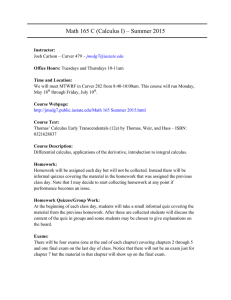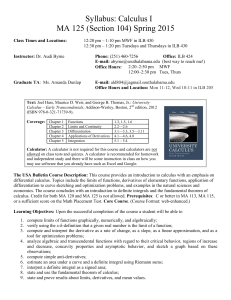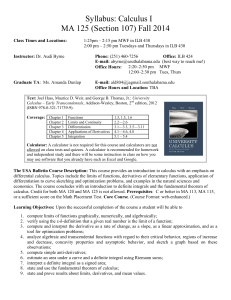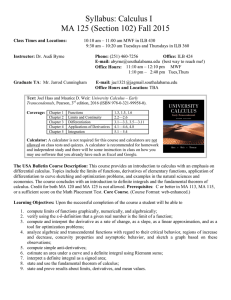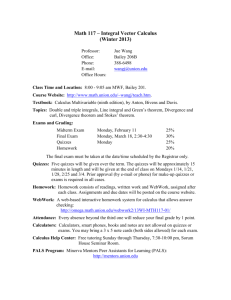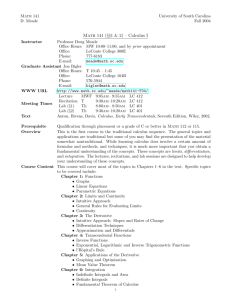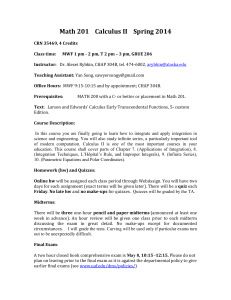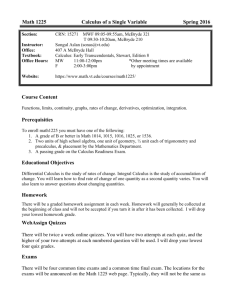MA125syllabusS2012 - University of South Alabama
advertisement
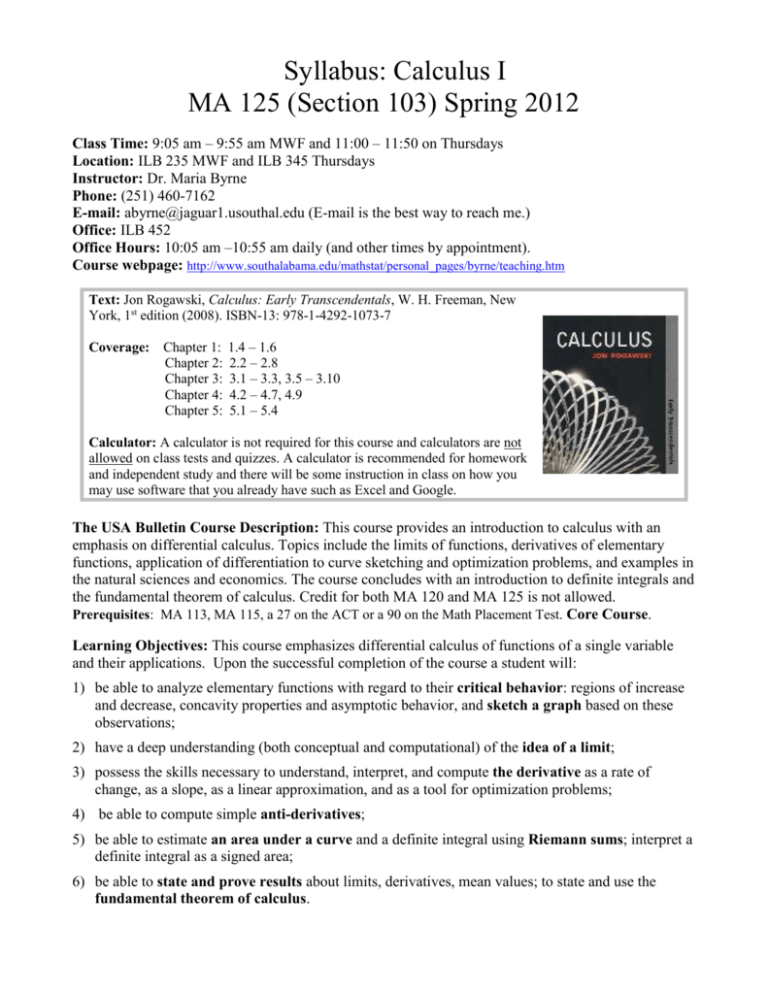
Syllabus: Calculus I MA 125 (Section 103) Spring 2012 Class Time: 9:05 am – 9:55 am MWF and 11:00 – 11:50 on Thursdays Location: ILB 235 MWF and ILB 345 Thursdays Instructor: Dr. Maria Byrne Phone: (251) 460-7162 E-mail: abyrne@jaguar1.usouthal.edu (E-mail is the best way to reach me.) Office: ILB 452 Office Hours: 10:05 am –10:55 am daily (and other times by appointment). Course webpage: http://www.southalabama.edu/mathstat/personal_pages/byrne/teaching.htm Text: Jon Rogawski, Calculus: Early Transcendentals, W. H. Freeman, New York, 1st edition (2008). ISBN-13: 978-1-4292-1073-7 Coverage: Chapter 1: Chapter 2: Chapter 3: Chapter 4: Chapter 5: 1.4 – 1.6 2.2 – 2.8 3.1 – 3.3, 3.5 – 3.10 4.2 – 4.7, 4.9 5.1 – 5.4 Calculator: A calculator is not required for this course and calculators are not allowed on class tests and quizzes. A calculator is recommended for homework and independent study and there will be some instruction in class on how you may use software that you already have such as Excel and Google. The USA Bulletin Course Description: This course provides an introduction to calculus with an emphasis on differential calculus. Topics include the limits of functions, derivatives of elementary functions, application of differentiation to curve sketching and optimization problems, and examples in the natural sciences and economics. The course concludes with an introduction to definite integrals and the fundamental theorem of calculus. Credit for both MA 120 and MA 125 is not allowed. Prerequisites: MA 113, MA 115, a 27 on the ACT or a 90 on the Math Placement Test. Core Course. Learning Objectives: This course emphasizes differential calculus of functions of a single variable and their applications. Upon the successful completion of the course a student will: 1) be able to analyze elementary functions with regard to their critical behavior: regions of increase and decrease, concavity properties and asymptotic behavior, and sketch a graph based on these observations; 2) have a deep understanding (both conceptual and computational) of the idea of a limit; 3) possess the skills necessary to understand, interpret, and compute the derivative as a rate of change, as a slope, as a linear approximation, and as a tool for optimization problems; 4) be able to compute simple anti-derivatives; 5) be able to estimate an area under a curve and a definite integral using Riemann sums; interpret a definite integral as a signed area; 6) be able to state and prove results about limits, derivatives, mean values; to state and use the fundamental theorem of calculus. Philosophy: The key to success in this class is to attend lectures regularly, complete homework assignments carefully and thoroughly and actively find ways to learn mathematics. You learn mathematics by identifying what you don’t yet understand, finding your own best methods of achieving understanding, and systematically practicing what you have understood. Course Resources: If you do not know how to do a homework problem, do not get behind. Check these sources of help: 1. Skim through examples in your class notes or the book section for a similar problem. If the problem is not similar enough, research the answer in other textbooks or on the internet. YouTube and the Kahn Academy (www.kahnacademy.org) are good resources for videos and tutorials. 2. Send your instructor an e-mail or plan to visit your instructor in person, either during office hours (no appointment necessary) or make an appointment outside those times. 3. Form study groups and work together! Students have reported that this is very helpful. 4. FREE TUTORING -- The department offers a tutoring lab in Room 456 to all students taking mathematics and statistics classes. There is no lab fee. Please check the bulletin board outside ILB 325 for details. Course Components Course Webpage: The course webpage will contain a copy of this syllabus, a list of all assigned homework problems, and any important announcements. It may also contain useful handouts for the coursework and solutions to the homework or tests. Attendance: Regular attendance is important in this course. It is your responsibility to get any assignments or notes missed during an absence. Roll will be taken randomly throughout the semester and attendance will be considered in determining borderline grades. Students may find that lectures are most effective if the relevant book section is read in advance. Homework (Not Collected): Homework problems from the text will be assigned with each book section. Problems will be announced in class and the list of assigned problems can also be found on the course webpage. Work all assignments promptly and carefully: this is essential to learning the material and doing well on quizzes and exams. Quiz and exam questions will be similar to the homework questions. Group work on homework is encouraged and it is recommended that any questions on the homework be promptly addressed with other classmates, at the tutoring lab or during my office hours. Quizzes – 15% There will be weekly quizzes. The quiz topic will often be announced during the proceeding class or will be drawn randomly from a homework problem. There will be no make-up quizzes, but your two lowest quiz grades (including missed quizzes) will be dropped. Three Exams – 20% 3 = 60% Exam I: Chapters 1 and 2 Exam II: Chapter 3 Exam III: Chapter 4 Thursday Thursday Thursday 2/16/2012 3/22/2012 4/19/2012 Final – 25% The final will be comprehensive but will emphasize material from Chapter 5. Wednesday Standard grading scale: 5/09/2012 8:00 - 10:00 a.m. A(90-100) B(80-89) C(70-79) D(60-69) F(0-59) Course Policies Communication: The best way to contact me is in person during my office hours or through e-mail. When sending e-mails, please include your name since it may be difficult to decode a student’s name from their e-mail address. I frequently send announcements, homework and exam solutions and links to other course resources via e-mail to your jaguar account. Please check this account regularly. Make-Up Exams: If you are unable to attend an exam you should contact me promptly: before the exam if possible, and otherwise, before the next class. Prompt communication and a compelling reason for absence will entitle you to a make-up exam. In special circumstances, for example if scheduling a make-up exam within a few days is precluded; a missed exam score may be replaced by the score on the final exam. Distractions: Turn off cell phones while you are in class. Texting, surfing the internet or working on other course work while in class is not allowed. This erodes the academic spirit of the class. Laptops for taking notes may be used only with prior permission. Leaving briefly or early during class is left at the discretion of the student, as long as such events are occasional and discrete. JagSuccess: JagSuccess is a program intended to help students be successful in 100 and 200 level courses. The purpose of the program is to provide early feedback to students having academic difficulties. If you are not doing well in this course, you will get an email in week 6 or 7 of the semester instructing you to see your professor along with instructions to access an online survey regarding class habits and study skills. Based on your survey score, you will receive recommendations for improving your performance. You will also be given a link to an online tutorial intended to help with common problems affecting academic performance. Dropping the Course: The last drop day for the course is Friday, April 6th. Note that by this date, you will have received feedback on Exams I and II. If you are considering dropping the course, please speak with me, the department chair (Dr. Mulekar) or the assistant to the chair (Dr. Brick) before dropping to discuss alternatives. Please contact me with your questions and problems with the course. Disabilities: If you have a specific disability that qualifies you for academic accommodations, please notify me and provide certification from the Office of Special Student Services located in the Student Center, Room 270, Phone 460-7212. The requirements and policies above may be modified as circumstances dictate. Such changes will be provided to the students in class and in writing. You will often first be notified of changes by e-mail, so please check your jaguar1 email accounts regularly.
